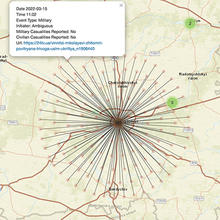- August 25, 2022
An important new study of 3,100 counties shows the relationship between a community’s mental health services and the local jail population. It also shows how to reduce that population.
- April 26, 2022
Undergraduate research isn’t a longshot at the Schar School, it’s encouraged.
- April 21, 2022
Researchers from the Schar School of Policy and Government’s Center for Advancing Correctional Excellence! and the College of Health and Human Services are translating research into actionable guidelines to help probation officers support their clients to achieve better outcomes.
- April 19, 2022
A new exhibition of original art commissioned to illustrate a book-length report by Schar School Professor J.P. Singh will be unveiled April 29, followed by a keynote from the ambassador from Tanzania and a panel discussion.
- April 4, 2022
The Schar School’s Center for Regional Analysis releases a study calculating the billions of dollars in economic benefits of one of the country’s largest transportation projects.
- March 15, 2022
The app allows users to filter an interactive map of rapidly developing events in specific neighborhoods throughout the besieged country. A link to the original media outlet accompanies each data point representing a military or nonmilitary event.
- February 25, 2022
Schar School of Policy and Government professor J.P. Singh leads a team of researchers from across George Mason University campuses that has been awarded a three-year, $1.39 million grant to study the economic and cultural determinants for global artificial intelligence (AI) infrastructures—and describe their implications for national and international security.
- January 26, 2022
The Schar School’s Naoru Koizumi leads a team of researchers working on a little-known public policy medical problem: racial disparity among live-donor kidney transplants.
- October 7, 2021
A new national survey of U.S. nonprofits shows scale of diversity and the effects of the pandemic on donation trends.
- August 12, 2021
New guidelines co-created by the Schar School’s Faye Taxman for the National Institute of Justice examines the “risk and needs assessment” instruments that impact those in correctional settings.









